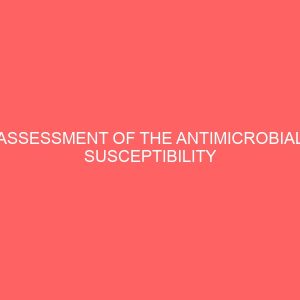Description
CHAPTER ONE
INTRODUCTION
1.0. BACKGROUND OF THE PROBLEM
This project is on Chi square analysis on the effect of high level of illiteracy to the growth of the society in Nigeria. The history and the problem of illiteracy are not unique to Nigeria as illiteracy encompasses all countries in the world. What matters here is not only the nature and magnitude of the problem, but also what has been done to address the problem. Throughout most of the human history a large proportion of people have been illiterate. This has been to the disadvantage of such people. Mulenga (2008:55) indicates that In the feudal society, for example, the ability to read and write was of value only to the clergy and aristocracy and the issue of illiteracy was not seen as a big problem then until after the invention of printing in the 15th Century?. In Nigeria, the problem of illiteracy dates back to the colonial era where colonial masters relegated local and traditional education to the fringes, while promoting Western education. Colonial masters denied the indigenous people universal education creating educated and illiterate people in a society that hitherto knew no such trends. This scenario did not take long to give birth to high illiteracy rates among men and women especially people in rural areas of Nigeria. This situation led to over 80 percent people of Nigerians not to have been to school a year before independence (Nyirenda, 1969 and Mwanakatwe, 1969). The majority of such people were women especially in rural areas who could not walk long distances to schools that were few and far apart. This state of affairs slowly began to cause anxiety as it came to boomerang against the colonial government in many aspects such as tax compliance and shortage of human resource for the expanding civil service and skilled manpower for the developing industries, commercial activities and other service providers. What should be capitalized on, here, is that most of the illiterate population exhibit an insatiable appetite and hunger for learning. What these people have desperately lacked has been a system of education which is designed to effectively take education out of the walls of institutions to where the need is great at an affordable cost. In fact, with such a problem in education, Coombs (1968) had recommended non-formal education as an alternative to formal schooling.
1.2 STATEMENT OF THE PROBLEM
Several studies and statistics show that illiteracy is still on the high side in Nigeria especially in rural areas and among women. There are various initiatives and strategies used aimed at reducing the problem of illiteracy. One such strategy has been the use of education broadcasting especially through radio instruction. Despite non-formal means of education playing a significant role in reducing illiteracy among Nigerians since 1962, there is a dearth of data on the impact that radio instruction has had in directly combating adult illiteracy in Nigeria This made it necessary for this study to examine the effect of illiteracy to the growth of the society using the Eruwa metropolis of Oyo state as a case study because the area is said to have a huge number of illiterates residing in the area. Therefore the research study would try to examine the causes as well as the effect of illiteracy to Eruwa metropolis.
1.3 PURPOSE OF THE STUDY
To examine the causes of high level of illiteracy in Nigeria. The study, therefore, purposed to examine the effects of illiteracy to the people of Eruwa metropolis and ways of reducing high level of illiteracy in Nigeria at large.
1.4 RESEARCH OBJECTIVES
The objectives of this study are:
I. To find out the causes of high level of illiteracy in the Eruwa metropolis
II. To identify the threat of illiteracy to the development of the Eruwa metropolis.
III. To find out the adequacy of literacy programme in solving illiteracy problems in Eruwa community.
IV. To find out the responsiveness of the literacy programme to the lives of people of the metropolis V. To investigate the solutions to be employ to reduce the high level of illiteracy in Nigeria.
1.5 RESEARCH QUESTIONS
The following are research questions that the study sought to answer in order to reach adequately reasoned conclusions:
I. What are the causes of high level of illiteracy in the Eruwa metropolis?
II. What are the threats or effects of illiteracy on the development of the Eruwa metropolis?
III. What is the adequacy of literacy programme in reducing illiteracy in the metropolis?
IV. How responsive is the literacy programme in the lives of people of the metropolis?
v. What are the solutions to remedy or reduce the high level of illiteracy in Nigeria?
1.6 THE SIGNIFICANCE OF THE STUDY
It was hoped that the findings of the study would reveal some significant effects and short-comings of high level of illiteracy to the development of the society. The findings of the study is significant in its attempt in bringing out the causes of illiteracy as well as the measures to be taken to reduce the rate of illiterate in the society.
1.7 SCOPE/LIMITATIONS OF THE STUDY
It is designed to study the Eruwa metropolis. Due to the problem of time and money, the researcher may also encounter certain other limitations such as the problem of having to manage class work with the research work as well as the problem of gathering enough materials for the study. But in spite of this, the researcher will make sure that all this problems are managed well in order to come up with a good result that can be a plus to the area of study.
1.8 RESEARCH METHODOLOGY
In this research, the use of primary data (questionnaire) will be adopted. Chi-Square statistics is used to investigate whether distributions of categorically variable differ from one and other. It will be deduced that there is a significance relationship between the Industrial training exposure programme and the academic performances of students. Chi-Square will be used in measuring the discrepancies between observed end expected values. This hypothesis shows that Chi-square analysis will enhance the significant relationship in the academics of students positively (+). 1.5
1.9 HYPOTHESIS A null hypothesis was postulated and verified at 0 .05 alpha levels.
1. There is a mutual relationship between illiteracy and society development
2. Illiteracy poses a threat on the continuous growth of the society.
3. There is an adequacy of literacy programme in solving illiteracy problems in Eruwa community.
4. There are responsiveness of the literacy programme to the lives of people of the metropolis







